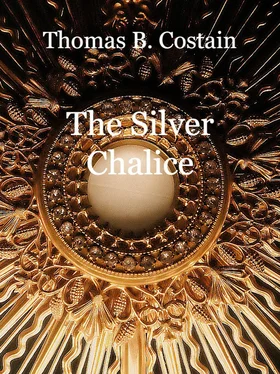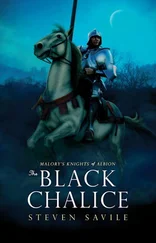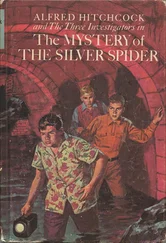Thomas B. Costain - The Silver Chalice
Здесь есть возможность читать онлайн «Thomas B. Costain - The Silver Chalice» — ознакомительный отрывок электронной книги совершенно бесплатно, а после прочтения отрывка купить полную версию. В некоторых случаях можно слушать аудио, скачать через торрент в формате fb2 и присутствует краткое содержание. Жанр: unrecognised, на английском языке. Описание произведения, (предисловие) а так же отзывы посетителей доступны на портале библиотеки ЛибКат.
- Название:The Silver Chalice
- Автор:
- Жанр:
- Год:неизвестен
- ISBN:нет данных
- Рейтинг книги:5 / 5. Голосов: 1
-
Избранное:Добавить в избранное
- Отзывы:
-
Ваша оценка:
- 100
- 1
- 2
- 3
- 4
- 5
The Silver Chalice: краткое содержание, описание и аннотация
Предлагаем к чтению аннотацию, описание, краткое содержание или предисловие (зависит от того, что написал сам автор книги «The Silver Chalice»). Если вы не нашли необходимую информацию о книге — напишите в комментариях, мы постараемся отыскать её.
The Silver Chalice — читать онлайн ознакомительный отрывок
Ниже представлен текст книги, разбитый по страницам. Система сохранения места последней прочитанной страницы, позволяет с удобством читать онлайн бесплатно книгу «The Silver Chalice», без необходимости каждый раз заново искать на чём Вы остановились. Поставьте закладку, и сможете в любой момент перейти на страницу, на которой закончили чтение.
Интервал:
Закладка:
Theron bade his son farewell with an air of assumed dignity. “You are going to live in great splendor,” he said. “But if you remember me, little son, let it not be with a sense of shame.”
He left the boy then in the care of a fiercely handsome major-domo with bristling black whiskers. His name was Castor and there was a shade of condescension in his manner because he knew Basil had been born and raised in the Ward of the Trades. “Come, boy,” he said. “I am to take you at once to the master. The master is a very rich man and one of great power. You will find things strange here.”
Humility was a quality that was soon beaten out of boys who lived on the other side of the Colonnade. Basil scowled at the major-domo. “The only things strange here,” he said, “is that a eunuch dares to speak thus to the son of the house.”
Castor found this retort to his liking. He grinned at Basil and said, “We will get along together, you and I.”
The cool halls of the house were filled with activity as the major-domo led the way up the wide stairs to the rooftop. Servants in fine robes were carrying up dishes of food and flagons of wine and bowls filled with pieces of ice, whispering as they passed each other; whispering about him, Basil realized at once, because there was a great deal of peering over shoulders in his direction and nodding of heads. “Children of filth!” said Castor, loosening the whip at his belt with furious relish. “Let one of them so much as smirk and they shall feel the sting of this on their behinds!”
Basil caught his breath in surprise when they reached the housetop. Curious mechanical aids were being used to supply comfort. Water pipes ran along the parapets and tiny streams were spouting forth from perforations in the metal. Fans then wafted the spray in all directions, so that a cool and pleasant mist filled the air with the effect of a perpetual breeze. At the far end, under a draped canopy of yellow silk, was a table of horseshoe shape, spread with silver and glass and an infinite variety of dishes made with a beautiful blue glaze. The table was dimly lighted, and at first the boy did not see the pretty lady reclining on a couch near the head.
His eyes instead were chained to the space inside the table where four girls in gauzy wide trousers were dancing on large glass balls. They were almost unbelievably expert, jumping from ball to ball like thistledown, spurning one with their feet while leaping to another, keeping all the glittering spheres in constant motion, their eyes laughing, their bare arms weaving to the music which came from instruments somewhere in the gloom. The glass balls tinkled with the clear, sharp sound of bells when they met, and they rolled with magic rhythm over the smooth plaster floor.
Then the boy became aware of the presence of the lady and he transferred his attention to her. She had, he saw, the fairest of hair and she was beautifully dressed in white and gold. He perceived also that she was taking no interest in the gay little dancers on the gyrating balls. This became apparent at the same time to a stout man who reclined on a couch beside her. He sat up with a resigned shake of his brown head.
“You are not watching, my loved one,” he said. “It cost me heavily to engage them for your amusement. They come from the very far lands of the East.”
“No,” answered the lady in a languid voice, “I am not watching the dancers. I have been more interested in this boy. He is, I suppose, our son.”
Ignatius had not been aware of Basil’s arrival. He turned at once with a smile and motioned the boy to approach closer. Basil knew that this was his first great test. The lady in gold and white was studying him closely, and he realized that his chance for a happy life in this amazing household would depend on whether or not she liked him. He took a quick second glance in her direction and decided that it would be an easy matter to like her. She was slender, and this made a great impression on him, for he was accustomed to maternal outlines that bulged and sagged. She was gentle in manner and speech, and he was accustomed to shrillness and the heavy impact of callused hands.
The instinct bred in him by conditions in the Ward told him to face them boldly and speak with small respect. A still deeper instinct whispered to him that this would be wrong, that he must be quiet and respectful and have little to say for himself. Obeying this second prompting, he remained where he was, his head lowered, his feet shuffling nervously.
“Don’t be afraid of us,” said the lady. Her voice was kind. “Come closer so I may see you better.”
Fighting down a desire to turn and run away, Basil moved forward on leaden feet. It became apparent at once, however, that he had passed muster, because the slender lady nodded her head and said to him, “I think you will make a nice son.” Then she turned to the swarthy Ignatius. “You have chosen well.”
The square countenance of the merchant lighted up immediately. He motioned Basil to take the couch on his other side.
“We are in great luck tonight, you and I, my son,” he said. “I did not expect you to be approved so quickly. Your new mother is not easy to please. It took me two years to win her favor. You have done it in two minutes.”
Basil had been accustomed to squatting on the floor and eating without ceremony and he was self-conscious when he found he was expected to stretch himself out on the couch and partake of the meal in a reclining position. The fare was so abundant and good, however, that the feeling of strangeness passed away. It was a matter of astonishment that the thick slices of cold mutton did not have to be counted or divided and that he could eat his fill of ripe dates and rich honey cakes. The wine, cooled in a deep jug in ice, was pure delight, and he swallowed it slowly. He watched his new mother and copied her manners, thereby saving himself from many mistakes.
After the meal a young Roman summoned the head of the household to a consultation with some visitors. Basil knew he was Roman because his manner was brisk and his tongue soft and drawling in its use of Koine. The merchant rose to his feet reluctantly and said, “Verily, Quintus Annius, I am the only slave in this establishment and you are my taskmaster.”
“I don’t believe your Quintus Annius ever eats or sleeps,” said the lady Persis in an indifferent tone. “He is such a busy young man!”
The sky was now sprinkled with stars, and Basil found himself curious as to how the world would look at night from such a height. He looked at the lady Persis, who had partaken of supper substantially and was now showing signs of drowsiness, and asked in a respectful voice, “Is it permitted that I look over the parapet?”
She sat up at once and dabbed her eyes with perfumed water that a slave girl brought her in a jeweled glass. “Be careful, then,” she said, straining to see him with shortsighted eyes. “We are so high from the ground that I never dare look over because of dizziness.”
Basil, who had played games of hide-and-seek across the flat roofs of the poor section, leaping from house to house, saw no risk in surveying the world from the vantage point of his new home. The artistic soul of the boy responded at once to the magic spectacle of Antioch after the coming of darkness. All the families in this privileged section spent the evenings on their rooftops. He could see they were supping in much the same lavishness by lighted lamps that winked at him like fireflies. The profile of a lady with a beautiful Grecian nose and a nimbus of fluffy black hair swung directly into his line of vision from the next house as she moved her position, then vanished into the shadows, although he could still see her fingers toying with a bunch of grapes. On the roof beyond this a man was singing and accompanying himself on a cithara, a professional entertainer without a doubt, for his voice was sure and well trained. A slight breeze had sprung up, bringing to the boy the most delightful scents from the gardens below. He looked up at the sky and was sure that the stars were larger and brighter here than anywhere else.
Читать дальшеИнтервал:
Закладка:
Похожие книги на «The Silver Chalice»
Представляем Вашему вниманию похожие книги на «The Silver Chalice» списком для выбора. Мы отобрали схожую по названию и смыслу литературу в надежде предоставить читателям больше вариантов отыскать новые, интересные, ещё непрочитанные произведения.
Обсуждение, отзывы о книге «The Silver Chalice» и просто собственные мнения читателей. Оставьте ваши комментарии, напишите, что Вы думаете о произведении, его смысле или главных героях. Укажите что конкретно понравилось, а что нет, и почему Вы так считаете.












